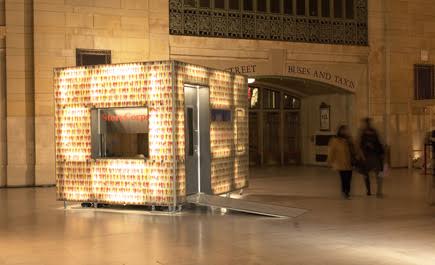The Conversation
Last week I heard a StoryCorps podcast that still has me thinking.
StoryCorps is a place where people record interviews. They started in 2003 by setting up a booth in Grand Central Terminal in New York City.
Their history is fascinating, and is told on their site. Also at the site are links to find ways to record your own interviews, and instructions for how to prepare for such an interview. Often the interviews are family members interviewing each other about significant happenings in their lives.
Over the years they have initiated projects to capture the stories of particular groups of people. There are mobile booths that travel to communities.
They have initiatives for families who have a member with a terminal illness. There are other initiatives for African American stories, Latin American stories, stories from the juvenile justice system, collecting stories from elders with memory loss, military stories, September 11 stories, stories from the LGBTQ community...
They have initiatives for families who have a member with a terminal illness. There are other initiatives for African American stories, Latin American stories, stories from the juvenile justice system, collecting stories from elders with memory loss, military stories, September 11 stories, stories from the LGBTQ community...
At holidays, they encourage people to use their smart phone app to do family interviews at reunions.
The stories are archived at the American Folklife Center in the Library of Congress in Washington D.C. and can be accessed there. Someday, hopefully, they will all be available online. Right now a limited number are available at the web site.
Every Friday, on NPR, they play excerpts of one interview that was especially poignant.
And...
they have a podcast.
The podcast allows them to do a show on a number of interviews on the same topic. Or they can do a more in depth story about the background behind one interview.
So that is a long introduction to this story.
Near December 14, I heard an interview recorded between a father, and the murderer of his son. It was recorded for broadcast on the 25th anniversary of the murder, which was part of a school shooting.
Near December 14, I heard an interview recorded between a father, and the murderer of his son. It was recorded for broadcast on the 25th anniversary of the murder, which was part of a school shooting.
There was something about this interview that was special, especially about the father, and about how he processed this terrible nightmare event in the life of his family.
I made Chuck listen to it, and he was glad he did.
I used it for devotions at my small group the next day. I was only going to play half of it, but they wanted to hear the whole thing.
My question after hearing it is this:
What does redemption mean?
How did this father find redemption for the tragedy in his life?
What difference does it make to see the humanity of the people who could have prevented the harm that came to you?
In which of my stories do I most need redemption?
And finally,
Where do I need to see the humanity of people whom I might find it easy to demonize?
And finally,
Where do I need to see the humanity of people whom I might find it easy to demonize?
Do you want to listen?





Comments